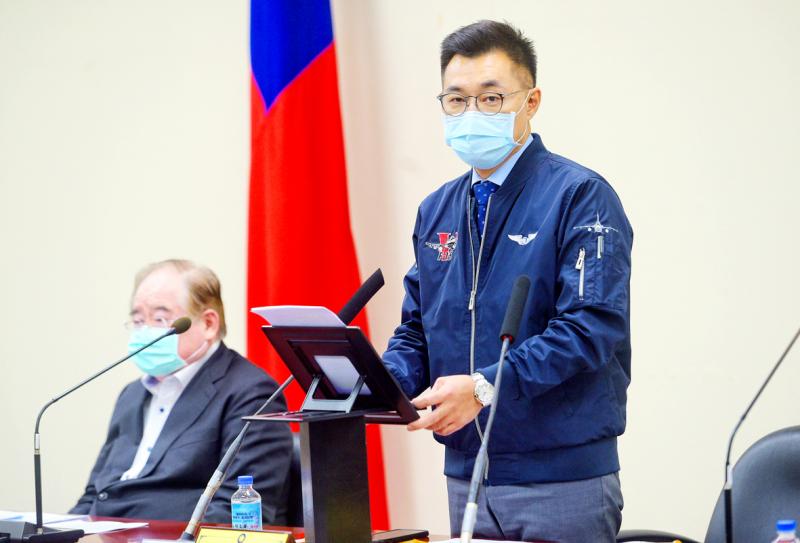The government should issue cash handouts instead of coupons as part of its relief and recovery plan for the COVID-19 pandemic, the Chinese Nationalist Party (KMT) said yesterday.
The effectiveness of the coupon policy proposed by the Ministry of Economic Affairs might be limited due to its use of mobile payment systems and other restrictions, the party said.
Older people and those unfamiliar with mobile payment systems might find redeeming the coupons inconvenient, it said.

Photo: Chang Chia-ming, Taipei Times
The proposed coupons, which would give people a 25 percent discount on some purchases, “ignores the problem that poor and unemployed people have trouble paying even basic expenses,” it added.
Citing Singapore’s response as an example, KMT Legislator Alicia Wang (王育敏) said that the city-state’s government plans to give S$600 (US$420) to citizens aged 21 and older.
In Taiwan, the tourism and transportation industries can receive NT$10,000 (US$332) per month in wage subsidies for each worker, while service industries hit especially hard by the pandemic can receive up to NT$20,000 per month per employee, said Wang, who chairs the KMT Culture and Communications Committee.
In Singapore, the government is subsidizing 75 percent — to a maximum of S$4,600 — of all workers’ wages this month, she said.
Local governments have “almost no role” in a NT$60 billion special budget approved by the Legislative Yuan last month, the KMT said.
Local governments have a better understanding than the central government about which local small businesses, self-employed workers and geographic areas require aid, the party said, adding that the central government should give local governments a more active role in distributing relief funds.
Amid the intensifying calls from the KMT for cash handouts this week, Premier Su Tseng-chang (蘇貞昌) on Tuesday said that the effectiveness of distributing cash would not be great.
Instead of doing what is “most convenient” and handing out cash, the government has taken the time to make plans for each industry, he said.
If the government only handed out cash, some people would spend it, while others might save the money, he added.
Many of the Executive Yuan’s plans involve giving out cash, Su said.
However, not everyone would be eligible, he said, adding that cash is being given to disadvantaged groups, such as mid-to-low income households and people with special circumstances in need.
An example of special circumstances would be if an employer is unable to pay its employees, he added.
The government is not saying that cash handouts cannot be made, but it would be “lazy” to not distinguish between wealthy and poor groups, and make everyone eligible, Su said.
Minister Without Portfolio Kung Ming-hsin (龔明鑫) on Tuesday told a news conference that if the government gave every resident NT$12,000 like Singapore, the money would also trickle down to business owners, who would still proceed with any plans to cut their payrolls, even after receiving a handout.
Additional reporting by Chen Yu-fu, Peng Wan-hsin and Lin Liang-sheng

South Korean K-pop girl group Blackpink are to make Kaohsiung the first stop on their Asia tour when they perform at Kaohsiung National Stadium on Oct. 18 and 19, the event organizer said yesterday. The upcoming performances will also make Blackpink the first girl group ever to perform twice at the stadium. It will be the group’s third visit to Taiwan to stage a concert. The last time Blackpink held a concert in the city was in March 2023. Their first concert in Taiwan was on March 3, 2019, at NTSU Arena (Linkou Arena). The group’s 2022-2023 “Born Pink” tour set a

CPBL players, cheerleaders and officials pose at a news conference in Taipei yesterday announcing the upcoming All-Star Game. This year’s CPBL All-Star Weekend is to be held at the Taipei Dome on July 19 and 20.

The Taiwan High Court yesterday upheld a lower court’s decision that ruled in favor of former president Tsai Ing-wen (蔡英文) regarding the legitimacy of her doctoral degree. The issue surrounding Tsai’s academic credentials was raised by former political talk show host Dennis Peng (彭文正) in a Facebook post in June 2019, when Tsai was seeking re-election. Peng has repeatedly accused Tsai of never completing her doctoral dissertation to get a doctoral degree in law from the London School of Economics and Political Science (LSE) in 1984. He subsequently filed a declaratory action charging that

The Hualien Branch of the High Court today sentenced the main suspect in the 2021 fatal derailment of the Taroko Express to 12 years and six months in jail in the second trial of the suspect for his role in Taiwan’s deadliest train crash. Lee Yi-hsiang (李義祥), the driver of a crane truck that fell onto the tracks and which the the Taiwan Railways Administration's (TRA) train crashed into in an accident that killed 49 people and injured 200, was sentenced to seven years and 10 months in the first trial by the Hualien District Court in 2022. Hoa Van Hao, a